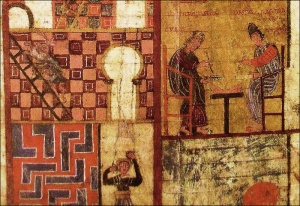Teaching Palaeography I: wisdom pills (my experience)
This semester will mark my tenth year teaching Palaeography in higher education. What follows are my reflections over the past years, summarised in the things I wish someone had told me when I started.
1. Not everyone loves Palaeography as much as you do.
It is hard to realise people – particularly students for this matter – do not instantly love Palaeography, not even once they are told what it is... (let’s face it, I’m sure you have said “No, I don’t do dinosaurs” as much as I do). So, it is crucial to learn how to sell it: think of something catchy related to your manuscripts, build a story, engage and inspire your audience.
2. It is not the same to teach BA and MA – or higher – levels.
BA students do not know what Palaeography means and will be in your class because they have to. MA students do know what you do and want to know more, willingly. It might sound silly but it (should) makes your teaching methodology different.
3. We are demanding too much from BA students.
In Spain, Palaeography is mandatory within the curriculum of the BA in History (sometimes also in those of Classics and Humanities). But that does not mean it is taught at the same level in all centres. For example, when I began teaching at the Universidad Autònoma de Barcelona, we had one full academic year (two semesters) to teach Palaeography (from Roman to Humanistic scripts), devoting a few classes to Diplomatics, Epigraphy and Numismatics. At the Universidad de Salamanca, the same class is compacted in one semester and taught by four different teachers (one for Epigraphy, one for Numismatics, one for Medieval Palaeography and Diplomatics, another for Modern Palaeography and Diplomatics). That means I only have 3 weeks to teach students all that needs to be known from the 8th to the 14th century. It is impossible to achieve mastering History of Writing and transcription/edition of manuscript material in that span of time. Do adjust to the time you have.
4. Not all students are the same.
Besides adapting your method to BA or MA students and to the time you have to teach them, one needs to adapt teaching to every single student. It might sometimes be near impossible, for in Spain we usually have more than a hundred students per class, but it is feasible to some extent. Be aware of those who like the topic, ask them for their preferences (Antiquity, Medieval, Modern), bear in mind their needs (I once had a student with dyslexia and she excelled in Manuscript Studies!), and find a way to keep them all engaged – if you are unable, just ask them.
5. Be aware of their limitations when assigning tasks.
Besides the final exam, all students have mandatory assignments to work on, from your class and others. Do not ask them to do something you consider they should be able to do (for example, transcribe a page of a codex), rather ask them to work on something that will make them achieve the knowledge you think they should master; so, make them think (answer a question, for example) rather than do.
6. BA students do not know Latin (alas).
Unfortunately, at least in Spain and due to all the changes in the curriculum enforced through the years, Latin, once a mandatory class in History, no longer is, but Palaeography is still there. So, be aware that your students will more likely have no idea of Latin. And worse, they will be scared. Reassure them that understanding History of Writing could be done without it.
7. Showing instead of telling.
We are lucky our science makes everyone curious, explore that curiosity! Instead of telling them about writing supports and materials, show them a piece of parchment and a medieval-like pen; better than talking about the peculiarities of the alphabets make them experience them first hand; take a facsimile to class with you rather than telling them codices were big… you know what I mean.
8. What does it mean to be a palaeographer?
Most people – students included if they know what the term Palaeography means – believe palaeographers do editions of manuscripts; not even transcriptions, just editions (the difference is something that needs to be clarified too). So, explain to them what to be a palaeographer really means. It is all about people and how they express themselves in writing. Students are people too and they do write; they will instantly connect.
9. Stress the importance of Palaeography as a science.
Until very recently, Palaeography has been considered an auxiliary science to History. It was difficult for academia to change its collective mind, it should no longer be for us, our students, and our colleagues. Palaeography is a science by its own right, and it gives information to History as much as the other way round. Tell your students that to be a specialist in Manuscript Studies is something not only full of wonders but that pays well – it will make them care more about learning it.
10. Everyone loves medieval manuscripts!
It might not be as much as you do (#1) but, in my experience, once you begin talking about manuscripts most people feel instantly attracted to them. I do not know why (which manuscript do they have in mind? How do they picture a manuscript?) although I fear it might be related to the “dark ages” thingy, unfortunately.
Do you have another wisdom pill you would like to share?
by A. Castro


Ainoa
Prof David Ganz sent me his thoughts on this publication:
"The magical moment when a student, at any level, encounters something written one thousand years ago is part of the birthright of every student, even if he/she is studying business or computer science. Manuscripts are a part of our heritage.
In the 21st century Palaeography must include the scientific study of manuscripts, raman spectroscopy, DNA analysis and digital Palaeography.
Palaeography, or this history of the medieval book, is also about the construction of convincing arguments and so teaches skills as well as facts.
To study texts and documents in their original form reveals facts about them and the societies where they were produced which cannot be found in printed editions.
The study of manuscripts must be comparative. Palaeographers are of necessity for Europe and not for Brexit".
I think it was importat to share them too :)
Thank you!